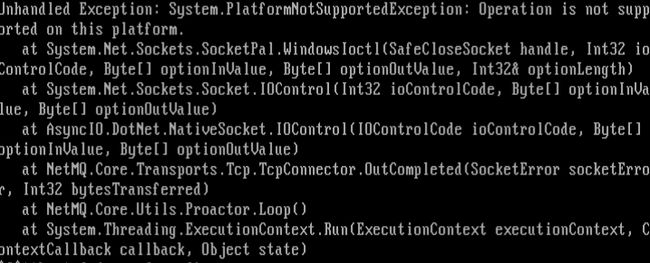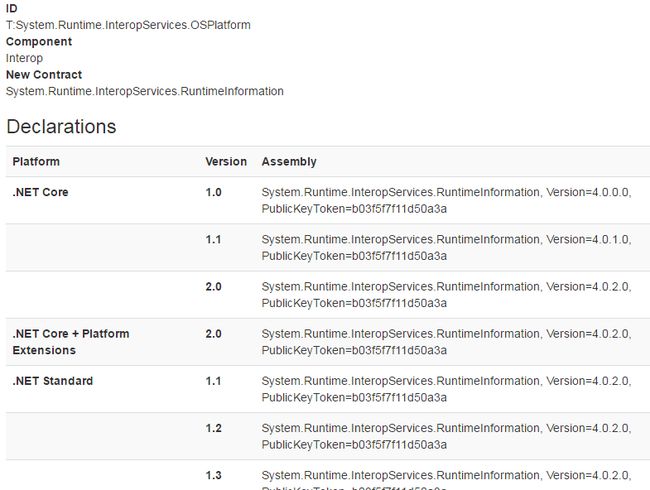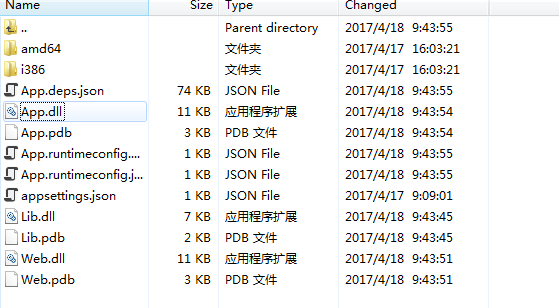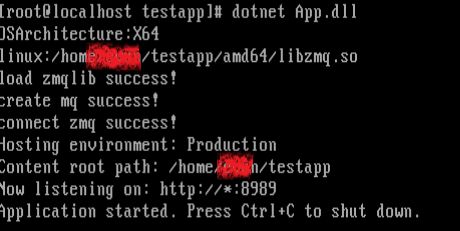缘起netcore框架下实现基于zmq的应用。
在.net framework时代,我们进行zmq开发由很多的选择,比较常用的有clrzmq4和NetMQ。 其中clrzmq是基于libzmq的Interop包装,
NetMQ是100%C#的zmq实现(基于AsyncIO组件)。以上两种组件我都有过应用,孰优孰劣各有千秋,本文就不详谈了。
回归正题,netcore下使用zmq首先也是想到引用上述组件,实践后发现clrzmq暂时没有基于netstandard或者netcore的支持,而NetMQ做的比较好,已经基于
netstandard1.3进行了支持。
一番折腾,搭程序,配环境。。。而后 dotnet run ,在windows下正常呈现了zmq的各项功能。
于是继续dotnet publlish,通过Wnscp拷贝到centos7下执行。立即报错,
挺意外的,本以为NetMQ已经基于netstandard进行了支持,也应该对跨平台进行支持。 可事实是AsyncIO的IOControl方法not supported on linux platform/
无奈,网上搜了会,也没找到任何关于netcore在linux下进行zmq的相关内容, 事实上也没有看到AsyncIO或者NetMQ有关于跨平台支持的说明。
既然现有方式行不通那就只好自己动手了,自己操刀通过Interop包装libzmq来实现跨平台的zmq应用吧!
首先看下libzmq的组件目录: 按x86和x64平台分为i386文件夹和amd64文件夹,且都包含windos下的dll组件和linux下的so组件
这挺难办了,要想做好还得考虑平台类型 和 操作系统类型, 还要想想 netcore里有没有相关API提供。
先是网上搜了圈,也极少有关于netcore进行平台判断相关内容。根据以往在framework下的经验,直接到https://apisof.net搜索相关关键字
:OSPlatform
非常不错,netcore已经提供了,同理搜索了 OSArchitecture 、DllImport 等都发现netcore1.1版本已经实现了相关api (说白了是netstandard已经实现了相关API)
准备就绪,直接开干,首先是平台相关信息判断,并加载目标组件 (具体方式请参照如下代码)
class ZmqNative { private const string LibraryName = "libzmq"; const int RTLD_NOW = 2; // for dlopen's flags const int RTLD_GLOBAL = 8; [DllImport(@"libdl")] static extern IntPtr dlopen(string filename, int flags); [DllImport("libdl")] protected static extern IntPtr dlsym(IntPtr handle, string symbol); [DllImport("kernel32.dll")] static extern IntPtr LoadLibrary(string filename); private static IntPtr LibPtr = IntPtr.Zero; static ZmqNative() { Console.WriteLine("OSArchitecture:{0}",RuntimeInformation.OSArchitecture); try { var libPath = @"i386"; if (RuntimeInformation.OSArchitecture == Architecture.X86) { libPath = @"i386"; } else if (RuntimeInformation.OSArchitecture == Architecture.X64) { libPath = @"amd64"; } else { Console.WriteLine("OSArchitecture not suported!"); } if (RuntimeInformation.IsOSPlatform(OSPlatform.Windows)) { var libName = $"{AppContext.BaseDirectory}\\{libPath}\\{LibraryName}.dll"; Console.WriteLine("windows:{0}", libName); LibPtr = LoadLibrary(libName); } else if (RuntimeInformation.IsOSPlatform(OSPlatform.Linux)) { var libName = $"{AppContext.BaseDirectory}/{libPath}/{LibraryName}.so"; Console.WriteLine("linux:{0}", libName); LibPtr = dlopen(libName, RTLD_NOW|RTLD_GLOBAL); if(LibPtr!=IntPtr.Zero) { var ptr1 = dlsym(LibPtr, "zmq_ctx_new"); context = Marshal.GetDelegateForFunctionPointer(ptr1) ; var ptr2 = dlsym(LibPtr, "zmq_socket"); socket = Marshal.GetDelegateForFunctionPointer (ptr2); var ptr3 = dlsym(LibPtr, "zmq_connect"); connect = Marshal.GetDelegateForFunctionPointer (ptr3); } } else { Console.WriteLine("OSPlatform not suported!"); } if (LibPtr != IntPtr.Zero) Console.WriteLine("load zmqlib success!"); } catch(Exception ex) { Console.WriteLine("load zmqlib error:\r\n{0}",ex); } } public delegate IntPtr ZmqContext(); [DllImport(LibraryName, EntryPoint = "zmq_ctx_new", CallingConvention=CallingConvention.Cdecl)] public static extern IntPtr zmq_ctx_new(); public static ZmqContext context = null; public delegate IntPtr ZmqSocket(IntPtr context, Int32 type); [DllImport(LibraryName, EntryPoint = "zmq_socket", CallingConvention = CallingConvention.Cdecl)] public static extern IntPtr zmq_socket(IntPtr context, Int32 type); public static ZmqSocket socket = null; public delegate Int32 ZmqConnect(IntPtr socket, IntPtr endpoint); [DllImport(LibraryName, EntryPoint = "zmq_connect", CallingConvention = CallingConvention.Cdecl)] public static extern Int32 zmq_connect(IntPtr socket, IntPtr endpoint); public static ZmqConnect connect = null; [DllImport(LibraryName, EntryPoint = "zmq_errno", CallingConvention = CallingConvention.Cdecl)] public static extern Int32 zmq_errno(); [DllImport(LibraryName, EntryPoint = "zmq_strerror", CallingConvention = CallingConvention.Cdecl)] public static extern IntPtr zmq_strerror(int errnum); }
以上为测试代码,请自动忽略代码质量!
简单解释下,如上代码通过平台判断,动态加载组件,采用LoadLibaray的方式。 有心的同学可能会发现几个delegate并且在Linux部分内通过dlsym获取了函数指针,具体原因下面会讲。
以上测试代码,在windows平台下同样正常无误, 而在linux下还是遇到几个小坑~~容我慢慢道来:
1、通过DllImport进行Interop的时候,组件路径必须是确定的,这就引起了如何动态加载不同目录下组件的问题;
好在windows平台下通过LoadLibaray加载dll到进程空间后,DllImport标记的函数就从进程空间查找,不会重复import组件了。
而同样的原理在linux下用dlopen却不能实现,还是会提示找不到组件
2、初次部署centos7上时,报找不到libdl.so组件问题,主要原因是系统下没有glibc的原因,该问题可以通过yum安装glibc的方式解决;
//先查找系统内是否存在组件 $ sudo find / -name libdl* //如不存在则安装glibc # yum install glibc #安装完毕后进行链接 $ sudo ln -s /usr/lib64/libdl.so.2 /usr/lib64/libdl
3、解决了libdl组件问题后,继续运行还是会发现报找不到libzmq组件的问题,实际就产生了问题1中所描述的,在linux系统下dlopen后,Interop过的函数并不会从进程空间查找。
为了解决上面遇到的问题,我们还有一条办法,就是创建 delegate , 并且通过LoadLibaray组件后通过GetProcAddress方式获取函数指针了。 具体的解决方案在上述测试代码已经体现了,这里就不过多解释了。
以上,就全部解决了在 netcore框架基础上进行跨平台native组件应用的问题。 真实测试结果如图:
请主动忽略初zmq应用外的其他信息, 本次测试一同测试了通过App入口启动webapi + websockets + zmq ,api创建为aspnetcore在Web.dll内,websockets在Lib.dll内,zmq在App.dll内。
补充下完整测试代码:
using System; using System.Collections.Generic; using System.Text; using System.Runtime.InteropServices; namespace App { class ZmqNative { private const string LibraryName = "libzmq"; const int RTLD_NOW = 2; // for dlopen's flags const int RTLD_GLOBAL = 8; [DllImport(@"libdl")] static extern IntPtr dlopen(string filename, int flags); [DllImport("libdl")] protected static extern IntPtr dlsym(IntPtr handle, string symbol); [DllImport("kernel32.dll")] static extern IntPtr LoadLibrary(string filename); private static IntPtr LibPtr = IntPtr.Zero; static ZmqNative() { Console.WriteLine("OSArchitecture:{0}",RuntimeInformation.OSArchitecture); try { var libPath = @"i386"; if (RuntimeInformation.OSArchitecture == Architecture.X86) { libPath = @"i386"; } else if (RuntimeInformation.OSArchitecture == Architecture.X64) { libPath = @"amd64"; } else { Console.WriteLine("OSArchitecture not suported!"); } if (RuntimeInformation.IsOSPlatform(OSPlatform.Windows)) { var libName = $"{AppContext.BaseDirectory}\\{libPath}\\{LibraryName}.dll"; Console.WriteLine("windows:{0}", libName); LibPtr = LoadLibrary(libName); } else if (RuntimeInformation.IsOSPlatform(OSPlatform.Linux)) { var libName = $"{AppContext.BaseDirectory}/{libPath}/{LibraryName}.so"; Console.WriteLine("linux:{0}", libName); LibPtr = dlopen(libName, RTLD_NOW|RTLD_GLOBAL); if(LibPtr!=IntPtr.Zero) { var ptr1 = dlsym(LibPtr, "zmq_ctx_new"); context = Marshal.GetDelegateForFunctionPointer(ptr1) ; var ptr2 = dlsym(LibPtr, "zmq_socket"); socket = Marshal.GetDelegateForFunctionPointer (ptr2); var ptr3 = dlsym(LibPtr, "zmq_connect"); connect = Marshal.GetDelegateForFunctionPointer (ptr3); } } else { Console.WriteLine("OSPlatform not suported!"); } if (LibPtr != IntPtr.Zero) Console.WriteLine("load zmqlib success!"); } catch(Exception ex) { Console.WriteLine("load zmqlib error:\r\n{0}",ex); } } public delegate IntPtr ZmqContext(); [DllImport(LibraryName, EntryPoint = "zmq_ctx_new", CallingConvention=CallingConvention.Cdecl)] public static extern IntPtr zmq_ctx_new(); public static ZmqContext context = null; public delegate IntPtr ZmqSocket(IntPtr context, Int32 type); [DllImport(LibraryName, EntryPoint = "zmq_socket", CallingConvention = CallingConvention.Cdecl)] public static extern IntPtr zmq_socket(IntPtr context, Int32 type); public static ZmqSocket socket = null; public delegate Int32 ZmqConnect(IntPtr socket, IntPtr endpoint); [DllImport(LibraryName, EntryPoint = "zmq_connect", CallingConvention = CallingConvention.Cdecl)] public static extern Int32 zmq_connect(IntPtr socket, IntPtr endpoint); public static ZmqConnect connect = null; [DllImport(LibraryName, EntryPoint = "zmq_errno", CallingConvention = CallingConvention.Cdecl)] public static extern Int32 zmq_errno(); [DllImport(LibraryName, EntryPoint = "zmq_strerror", CallingConvention = CallingConvention.Cdecl)] public static extern IntPtr zmq_strerror(int errnum); } class ZContext { private static IntPtr _context = IntPtr.Zero; static ZContext() { if (ZmqNative.context != null) { _context = ZmqNative.context(); } else { _context = ZmqNative.zmq_ctx_new(); } if (_context == IntPtr.Zero) { Console.WriteLine("zerror:{0}", ZError.GetLastError()); } } public static IntPtr Current { get { return _context; } } } class ZError { public static string GetLastError() { var error = string.Empty; var no = ZmqNative.zmq_errno(); if (no != 0) { var ptr = ZmqNative.zmq_strerror(no); error = Marshal.PtrToStringUTF8(ptr); } return error; } } enum ZmqSocketType :int { SUB = 2 } class ClrZmq { private IntPtr zmq = IntPtr.Zero; public ClrZmq(string url) { Url = url; } public string Url { get; private set; } private bool _IsStarted= false; public bool IsStarted { get { return _IsStarted; } } public void Start() { if (IsStarted) return; try { if (ZmqNative.socket != null) zmq = ZmqNative.socket(ZContext.Current, (int)ZmqSocketType.SUB); else zmq = ZmqNative.zmq_socket(ZContext.Current, (int)ZmqSocketType.SUB); if (zmq == IntPtr.Zero) { //error Console.WriteLine("zerror:{0}",ZError.GetLastError()); return; } Console.WriteLine("create mq success!"); var str = Marshal.StringToHGlobalAnsi(Url); var ret = 0; if (ZmqNative.connect != null) ret = ZmqNative.connect(zmq, str); else ret = ZmqNative.zmq_connect(zmq, str); if ( ret!= 0) { //error Console.WriteLine("zerror:{0}",ZError.GetLastError()); return; } Marshal.FreeHGlobal(str); Console.WriteLine("connect zmq success!"); } catch (Exception ex) { Console.WriteLine(ex); } } } }





